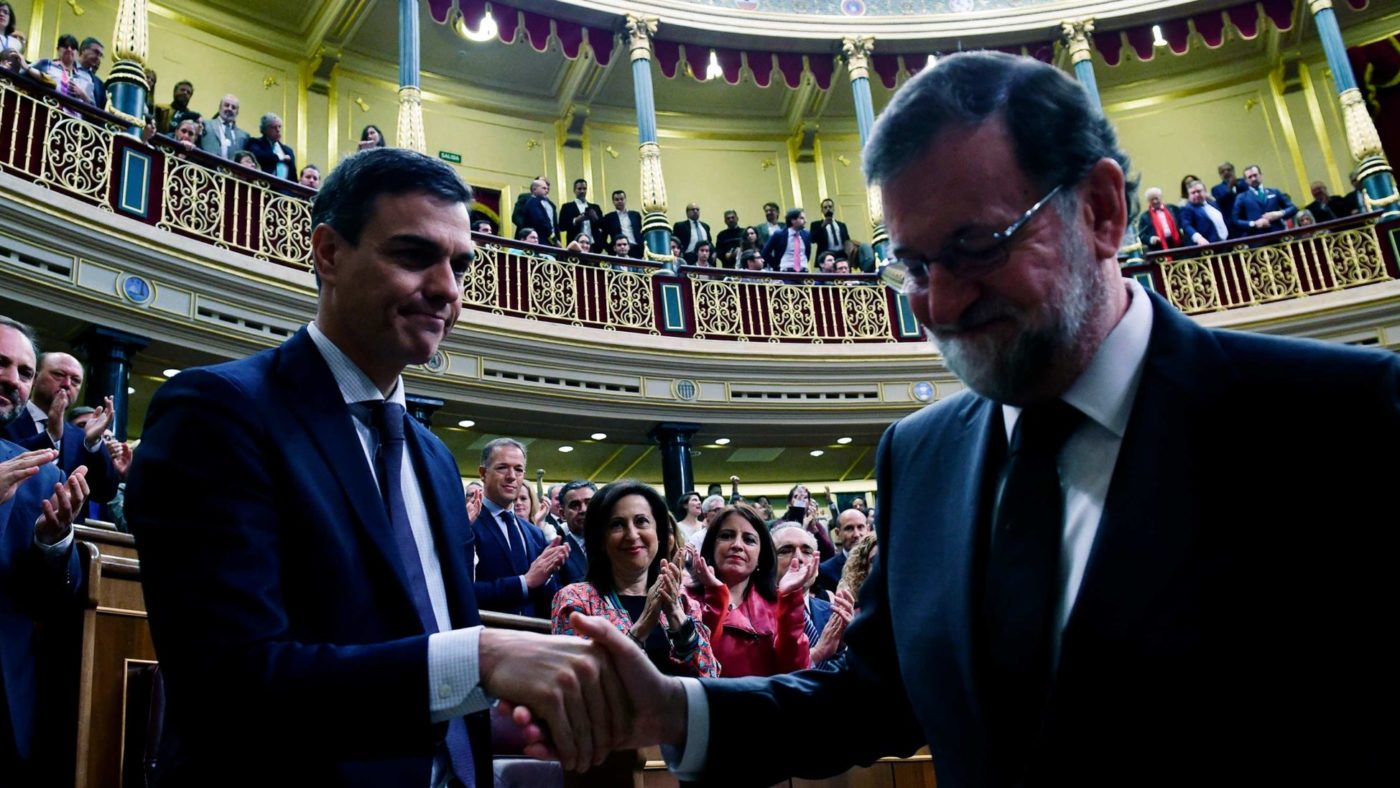When Spanish Prime Minister Mariano Rajoy had his budget passed by Congress two weeks ago, nothing indicated that he was about to be removed from office.
But one of the most successful political manoeuvres in the history of modern Spain came to a climax at the end of last week, when Rajoy was replaced as prime minister by Socialist party leader Pedro Sánchez.
It all began on May 24, when a Spanish court ordered Rajoy’s People’s Party to pay back £200,000 after it was found to have financially benefitted from a kickbacks scheme (dubbed the Gürtel Case by police). Although corruption scandals are not new for the People’s Party, this was the first time the it had been condemned as a legal entity for receiving illegal money
Opposition leader Pedro Sánchez did not take long to use the sentence as a justification to present a no-confidence motion against Prime Minister Rajoy. In contrast to no-confidence votes in the British Parliament, where the government must resign and call elections if defeated, Spanish law demands that the parliamentary group introducing the initiative put forward a candidate that would replace the current prime minister were Congress to vote in favor of the motion.
Against all odds, and despite being in a minority position (the Socialist group holds only 84 of 350 seats), Sánchez managed to win the support of a majority of Congress, taking over as prime minister the day after the vote. The ascension of Sánchez was made possible by the populist Left as well as Catalan secessionists and other minoritarian groups of the lower house.
The overthrow of Rajoy inaugurates a period in the Spanish political landscape characterised by uncertainty about the plans of the new government.
Pedro Sánchez does not seem willing to call elections in the short term. In fact, it is entirely possible that he will stay in office until the end of the term in 2020 without going to the polls. This could force him to enter into stable alliances with the populist Left (his partner in the ousting of Rajoy). That would be a worrying sign about Spain’s direction of travel and send the wrong signal to the international community and markets, who are understandably suspicious of this type of populism.
The potential repeal of the structural reforms that Rajoy’s government implemented during its first term is no doubt the main cause of concern for many observers both within and outside the country. The two pieces of legislation that are the most likely targets for repeal are Rajoy’s labour market and pensions reforms.
Few doubt that labour market reform has played a decisive role in tackling the unemployment crisis in Spain. Since 2013, the unemployment rate has gone down from a peak of 27 per cent to 17 per cent in 2018. Furthermore, the reform has provided the labour market with flexibility, an antidote against unemployment.
Although unpopular, the pension reform of 2013 put Spain’s pension system on a sustainable footing. Yet sustainability came at the expense of pension benefits: pensions were deindexed from inflation and a sustainably factor was introduced whereby the nominal value of pensions will decrease by 5 per cent annually as of 2019.
Abolishing this reform would entail a dramatic increase in the social security deficit over the following years, which would be funded via more public spending and debt. The message would be clear: fiscal responsibility is not one of this government’s priorities.
Sánchez himself is aware that the parliamentary weakness of his government might prevent him from undertaking these counter reforms. Even though it is not unreasonable to think that, if the opportunity arises, Sánchez will try to tear down some of the structural reforms of the previous government, gathering majorities to do so will pose a significant challenge for the new government.
However, the international economic context demands more than just accepting some of Rajoy’s reforms. Spain needs to undertake a new set of structural measures to strengthen the economy. A new reform that further liberalises the labour market or a substantial decrease in the corporate tax rate à la Ireland would make the economy more resilient against future economic downturns, boosting economic growth along the way.
Unfortunately, neither the current nor any other possible government that could emerge from the fragmented Spanish parliament would be willing to implement such ambitious reforms.
As long as Pedro Sánchez does not embark on a journey to nowhere involving the undoing of structural economic reforms, the economy will not deteriorate as a consequence of the change of government. But his government shows no promise when it comes to delivering the growth that the Spanish economy needs.


